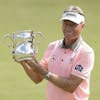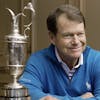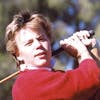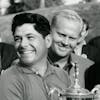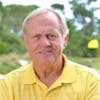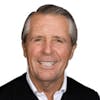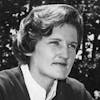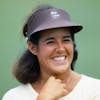Trevor Immelman - Part 2 (Amateur Career)
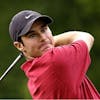
In this captivating second installment of our five-part interview with 2008 Masters Champion and CBS Golf Broadcaster, Trevor Immelman, we delve deeper into the rich tapestry of his early golfing years and the pivotal moments that shaped his amateur career. Our co-hosts, Mike Gonzalez and Bruce Devlin, engage Trevor in a reflective and insightful conversation, tracing his journey from a young golf prodigy in South Africa to a global golf icon.
Immelman fondly recounts his experiences as a junior golfer, highlighting the influential figures in South African golf, like Ernie Els and Tim Clark, who played a significant role in his development. He shares personal anecdotes that provide a glimpse into the mindset of a determined young golfer, revealing his unwavering passion and dedication to the sport. Trevor discusses the unique challenges he faced, such as adapting to different golfing environments and managing expectations, which were critical in his transition from amateur to professional play.
A significant portion of this episode is dedicated to Trevor's memorable participation in the 1999 Masters as an amateur. Listeners are treated to behind-the-scenes stories, including his practice rounds with legends like Gary Player and his unexpected run-in with Sam Snead. Immelman's vivid recollections of his first Masters experience, including the nerve-wracking moments leading up to making the cut, provide a thrilling and intimate perspective on one of golf's most prestigious events.
We also explore Immelman's thoughts on the modern paths of young golfers, contrasting his journey to today's landscape. His reflections on the evolving nature of golf, from technology advancements to the global expansion of the sport, offer invaluable insights into the game's future.
Join us in this engaging episode of "FORE the Good of the Game," as we continue to celebrate the history, culture, and personalities that define golf. Whether you're a seasoned golfer or a casual fan, Trevor Immelman's story is a testament to the enduring spirit of the game. Subscribe, share, and stay tuned for the next chapter in this remarkable series.
Follow our show and/or leave a review/rating on:
Our Website https://www.forethegoodofthegame.com/reviews/new/
Apple Podcasts https://podcasts.apple.com/us/podcast/fore-the-good-of-the-game/id1562581853
Spotify Podcasts https://open.spotify.com/show/0XSuVGjwQg6bm78COkIhZO?si=b4c9d47ea8b24b2d
Google Podcasts https://podcasts.google.com/feed/aHR0cHM6Ly9mZWVkcy5idXp6c3Byb3V0LmNvbS8xNzM3Mjc1LnJzcw
About
"FORE the Good of the Game” is a golf podcast featuring interviews with World Golf Hall of Fame members, winners of major championships and other people of influence in and around the game of golf. Highlighting the positive aspects of the game, we aim to create and provide an engaging and timeless repository of content that listeners can enjoy now and forever. Co-hosted by PGA Tour star Bruce Devlin, our podcast focuses on telling their life stories, in their voices. Join Bruce and Mike Gonzalez “FORE the Good of the Game.”
Thanks so much for listening!
Mike Gonzalez 00:15
There were so many great players that came before you down there. A lot of them we've mentioned . We've talked about Bobby Locke and Gary and you know, Nick Price, kind of a transplant, Ernie Els, Retief Goosen. You know some of the more contemporary guys. I guess Schwartzel and Oosthuizen. You had a guy down there, Timmy Clark, who you competed with I know. Tim spent a summer at our club in Chicago right after he finished his two years of school. And right before he was ready to go play pro, and I got to play with him a few times that summer. I just remember on a par 72 watching him and he was probably the best player I'd really seen up close and personal. over an extended timeframe. He shot 65 Like it was nothing.
Immelman, Trevor 00:58
Yeah, yeah. Mega, mega talented
Mike Gonzalez 01:01
And made everything he looked at.
Immelman, Trevor 01:03
Heah, I just spoke to him last week actually. So talented. He is about three years older than me. And so when I was coming into the junior ranks, he and Rory Sabbatini were the two superstars at that time. And Timmy has you know, amazing hands like his control the clubface and his ability to to put the sweet spot on the ball really is one of the best that I've seen. And he's a bit of a throwback, really the way he would play and the way he would hit shots and the feel that he had to be able to create the shots. You know, I sort of think at times that he was caught in the wrong era, you know, in the advent of this pro v1 coming out, and golf ball technology is really taking a big step and sizes of driver heads getting bigger and bigger that that did not do any good for him at all.
Mike Gonzalez 02:13
Yeah, he would have had more of an edge in the era of wooden heads and spinny balls.
Immelman, Trevor 02:17
100% Because he was able to really put that know where the sweet spot on the clubface was at all times. And, you know, so you couple that and link all of that with the injuries that he struggled with being born with his wrists fused? Right? Yeah. His his game, his swing, his body was just built for accuracy and not necessarily power. So you ran into, you know, bad timing from an equipment standpoint, but a wonderful, wonderful player and had, you know, when you're it's one of those names that, you know, you can forget about as the years pass, but every now and then when his name comes up, and people pay attention, and they go look at the record books. You know, unbelievable player, Presidents Cup. Players Championship, you know, way up there on career money earnings. And so, yeah, fantastic player.
Mike Gonzalez 03:27
So how old were you when you started thinking, hey, you know what, I'm pretty good at this. I want to try and compete and see how good I can get at this game?
Immelman, Trevor 03:41
Well, when I when I started, I told my parents I wanted to be a pro golfer, like, there was nothing else that was ever on my mind. You know, I didn't want to be a fireman or a teacher, or a pilot. It was just from the first day that I played golf. I told my parents, this is what I want to do. And thankfully, they believe me and they did whatever they could stretch themselves extremely thin timewise financially to enable me to try and have as best opportunity as I could. So very thankful for that. But it was about 12 or 13, I would say when rarely. It started to become apparent that I was just a little bit different. And was winning tournaments, local tournaments, Junior tournaments, won my first senior amateur event when I was 13. Won the South African Amateur I'm wanting to say when I was 16. And so it all happened quite quick in a in a three or four A year span of time there, where I got a little pop of distance as my body was maturing and I was becoming a teenager. And I was able to match the short game that I had with a little bit of distance and a lot of fire and determination. And really, from that moment on was when it became really serious. And started to compete over here in the States, and then eventually in British Amateurs and stuff like that. So I would say, probably from about the age of 12, was when it was apparent that, you know, I had an opportunity to play pro one day probably.
Devlin, Bruce 05:40
So it was 1993, was that the year you came over to play in the World Juniors. Was that the first year that you'd made that long trek to the United States to play golf?
Immelman, Trevor 05:51
Yeah, that sounds about right, played in the 13-14 division. And trying to remember now I think I lost in a playoff. That tournament as well finished in the top three. And then that got me to another tournament later that year that was in Japan, where they got a bunch of juniors from around the world to play together, and I won that one. And so wins like that was starting to happen. And I was just so focused, so determined, one track minded, everything was just about golf, improving, consuming as much of the sport as I could, whether it be watching every minute that I could win, when PGA TOUR events or majors were on TV in South Africa, which is, you know, in the middle of the night, because the time change to the point to where my dad built a chipping and putting green in our front yard. And, you know, so that I could practice on days when I couldn't get to the Golf Course, or, you know, come home from the Golf Course and do an extra 15 minutes putting work. And then that wasn't enough. So then we put a floodlight over the green so that I could practice at night. Like it's ridiculous when you start to remember stuff like that, but I was obsessed, obsessed, absolutely obsessed. And you know, when you speak to my school friends from that time now, you know, they'll all tell you that I was just crazy, like, there was nothing else. Nothing else in my mind whenever they were going to parties on a Friday night or whatever I would be practicing or getting ready for the tournament the next day, something like that. So yeah, it was it was the only thing that that I cared about and paid attention to.
Mike Gonzalez 08:09
You should compare notes with Amy Alcott sometime, if you haven't already with her front yard Golf Course with the, with the soup cans in the ground to putt into, she put nets up over all the windows on the front of the house, so she wouldn't break any windows.
Immelman, Trevor 08:24
Yeah look, I broke a few. And thankfully, we had wonderful neighbors, you know, it got to the point to where just chipping and putting around the green wasn't enough. Next thing I was taking it, you know, 100 150 yards away and hitting nine irons over four houses. Couldn't see the green and you know, every now and then you'd hear the ball clatter into a roof or something like that. And I'd be taking big divots out of our neighbor's grass, but they will. You know, they all just went along with it and understood that oh, it's that golf is pretty good. You know, maybe it'd be a pro one day and so they all just humored me and allowed me to to come onto their property and start whacking golf balls around the neighborhood. And it's interesting. When you think about, you know, you mentioned Amy Alcott and Phil Mickelson had a chipping green in his backyard. Ernie Els had a chipping green in his backyard. You know, there's a number of players through the years that you read those stories about where they were so in love with the sport that their parents found a way to, to encourage them.
Mike Gonzalez 09:35
You mentioned winning the South African Amateur. That was in 1997. Is it Humewood Golf Club.
Immelman, Trevor 09:41
That's it. That's it. It's one of our only links courses in South Africa
Mike Gonzalez 09:44
Over David Somervaille two and one. And you were then I think the medalist the next year in the event as well.
Immelman, Trevor 09:51
Yeah. Yeah, that's right. It was a wonderful time for me. So now I'm between like 16 and 18 years old. You know making the national team that South African Amateur win over David, he was from New Zealand actually. And all the top New Zealand amateurs were over for that South African Amateur because right after that South Africans were going to pick a test team, is the the the words we would use so four players, and we were going to go play a test match against New Zealand's best four players. And so yeah, it turned out that David and I played against each other in the final. And then we both went on to play in the test match the next week. So it was a great time for me, you know, to be traveling around all over South Africa and occasionally outside of South Africa to go play like the Eisenhower Trophy and different things like that we went to Chile to play that we went to Argentina to play some test matches and, and was great because you get to, you know, when you when you at that point, all you want to do is compete and, and prove how good you are, and prove that you're good enough, really, it's not necessarily not necessarily how good you are. But it's that you're good enough. And, you know, I remember even round and about that time 1997, playing in the the Amateur for the first time, and going over to the UK and playing links golf for the first time. And going down to Royal St. George's, which Bruce, you know, well and just being blown away by how you having to mold your game and hit different shots, and deal with the conditions and the wind pumping off the ocean and getting weird bounces and being stuck in these bunkers. And just feels like you're learning a whole new sport. And even then, though, it's like, okay, this is a little different. This is different to the type of golf that I'm used to playing back in South Africa. But you know, I honestly think I'm pretty good. And so I want to show you guys that I'm pretty good. And, and found my way to to get to, to the final that year as well. So, like I say it's just it's wanting to prove, prove yourself at all these different levels that that makes that time so much fun. And, and really allows you to hone your skills mentally and physically and emotionally. For for that for that day when you eventually do turn pro because that's when it really counts. That's when it really matters when the pressure really ratchets up, because now this is how you're going to feed yourself is is by getting a little white ball into a hole as few times as possible. And so those experiences where you have a little bit of adversity and you needing to fight to prove yourself really do serve you well in years to come.
Devlin, Bruce 13:12
So prior to you turning pro in 1999 at the age of 19, you won the U.S. Amateur Publinks Championship. You beat a professional by the name of Jason Dufner, you'll remember that I'm sure.
Immelman, Trevor 13:27
Yeah, for sure. That was that was a big deal. You know, I really wanted to one of my goals was to play in the Masters as an amateur. And that really was was why I wanted to go play the amateur at Royal St. George's. And that was that carrot that was dangling in front of me all week. And while I was you know, so distraught and upset when I eventually lost in the final. And at the time. My brother a few years prior had finished playing collegiate golf in Columbus, Georgia, and we had joined a club, a public club in Columbus called Bull Creek. And so we were members there and that was what allowed me to be able to play in the Public Links. And it was at Torrey Pines, I knew the area well and we played the Junior World there and actually went back and stayed with the host family that I always used to stay with when I played Junior World,
Devlin, Bruce 14:34
Isn't that amazing.
Immelman, Trevor 14:35
The Simons family who lived out at La Costa which is another place you'd know well. So it was a lot of fun. My parents came over and they got to meet the Simons family and you know thank them in person for looking after me for the years when I would come over and play and managed to work my way through the tournament and run into Jason Dufner in the final. We had a long delay because the marine layer rolled in we had about a three hour delay before we could tee off, but eventually got going. And that was really the icing on the cake for me for my amateur career was winning that tournament, winning a USGA event, getting that invite to the Masters and then being able to have that awesome experience in 1999
Devlin, Bruce 15:25
Yeah, wonderful.
Mike Gonzalez 15:27
Made the cut, finished 56th I think in that first Masters in 1999.
Immelman, Trevor 15:32
Yeah, it was just such a special week. Actually I have a picture of it up on the wall back over there. It was amazing. I was in Orlando, the week before working on my game. Went up to Augusta, practice rounds were just a dream, you know, played with Ernie. One of the days I played with Gary Player one of the days. I played with Jesper Parnevik one of the days. Played with Greg Norman and Nick Price in the Par Three tournament, It was just spectacular. After the practice round on Tuesday with Gary, which eventually became our tradition. Him and I would play together every Tuesday at 9 AM at the Masters and that particular day after we finished, I'm just this, you know, young kid, and he invited me up into the Champions Locker Room to have lunch with him. And we go up there and Sam Snead is up there, and he's holding court and he's sitting with us telling stories, and I was just this teenager with, you know, eyes, the size of plates, taking all of this in, looking around, feeling like, you know, how on earth have I found myself in this situation in this room with these legends? And eventually, the draw comes out. It was the first year, there were a couple of firsts in 1999. It was the first year they went to groupings instead of pairings on the first two days. So we played in threes. And I got drawn with Gary Player and Steve Stricker.
Mike Gonzalez 17:20
Oh, my,
Immelman, Trevor 17:21
And it was also the first year that a second cut was introduced. So first time that they had a longer cut, you know. At CBS we don't say, there's no rough, there's no such thing as rough at Augusta National. So it's called the second cut. But that was the first time that that was introduced. And so there was a couple of firsts. I got up and down on the 18th hole to a front right hole location for par on Friday. And I was on the bubble. At times during the afternoon. , it didn't look so good. And we were obviously all glued to the TV to see if I could make the cut. And you know, I've never told Tom Watson this. One day I'm going to probably. But I would have told him this story. Actually, I don't think I've told anybody this story. This might be the first time, but Tom Watson, the reason I made the cut was because Tom Watson, back right hole location at 16, we all know how tough that is. It's a tiny piece of green the size of a midsize rental car that you've got to try and leep the ball on. And you know, nine times out of 10 you pitch it half the way up the bank, it rolls to the lower level. You smash a 40 footer up the hill ,two putt and move to 17, or try not to three-putt if you can, but Tom Watson made the one mistake you can't make and he missed it in the right bunker. And it's so difficult from there. A lot of time that bunker holds a bit more moisture. And so you know when that happens, the ball comes out a little flatter. He couldn't keep the bunker shot on that top level, it rolls down to the bottom and then he three putted. So he made a double bogey five at the par three and he was the player that allowed my score to get into the weekend. So you know, I apologize but I may or may not have cheered while he made the double bogey on 16.
Mike Gonzalez 19:46
I'm gonna play this clip the next time we met with Tom, Bruce.
Immelman, Trevor 19:50
I was just a naive 18 year old wanting to play the weekend at the Masters. And so, lo and behold I make the cut. Huge thrill for all of us, the family had made the trip over. And the third day got drawn with Vijay Singh. And so was able to watch him. That's 1999. In 2000 he wins the Masters. Some crazy little things happened. But what an amazing week that was getting to meet some of your heroes like Payne Stewart and Vijay and Sam Snead and players like that.
Devlin, Bruce 20:30
Pretty fancy
Immelman, Trevor 20:31
For a young kid that grew up in in Somerset West, South Africa, it sure was a treat.
Mike Gonzalez 20:38
I'm sure it was of course, we're going to come back to Augusta National in a few years. But before we do, let's just cap off some of your amateur accomplishments before we get to turning pro. And one thing to talk about would be competing 30 years, actually 40 years after Bruce first competed in the Eisenhower Trophy. You competed in the 1998 edition, as you mentioned in Chile. And that had to be a fun experience as well.
Immelman, Trevor 21:07
Oh, it was wonderful. It was wonderful. Because you know, anytime you get to represent your country, it's a thrill. And so for us to go over there and compete with the best in the world in the amateur ranks that time really was amazing. We didn't play all that well. You're know, I'm wanting to say that the Australians won that year.
Mike Gonzalez 21:31
GB&I.
Immelman, Trevor 21:33
Was it a GB&I?
Mike Gonzalez 21:34
Aussies were second. So GB&I had a guy named Luke Donald on their team.
Immelman, Trevor 21:39
Is that right now. Now tell me was Gary Wolstenholme on that team as well back in those times
Mike Gonzalez 21:44
With the GB&I guys.
Immelman, Trevor 21:45
Yeah
Mike Gonzalez 21:46
He sure was.
Immelman, Trevor 21:47
Yeah, he's a legendary amateur golfer over there. Okay, I remember the Aussies being up there. Because, as always, the Aussies and the South Africans and the New Zealanders,we'd generally all congregate and hang out together. And those boys were playing well, and so we were rooting them on, we were not having our best time. But still, it was great to be able to go down there. The thing that really jumps out to me about that week is so, now what year was that? Was that 1998 or 1999
Devlin, Bruce 22:21
98
Mike Gonzalez 22:22
98? Yeah.
Immelman, Trevor 22:23
Okay, so leading up to that time, from really 1995 to 1998, I was spending a lot of time in America, playing junior golf, working on my game, and, you know, here in Orlando, at a place called Lake Nona. The reason for that is because that was where Ernie lived at the time. And so Ernie, now at this point, had heard about me and seeing me come through the ranks and we were starting to play a little golf together. He was starting to win majors, won the U.S. Open in 1994 and 1997. I'm able to spend time with him, in Orlando. Practice with him, learn from him. And because of him, I met another resident of Lake Nona, whose name is Jim Courier, the tennis player. Yeah, so we get down to play the Eisenhower in Chile. And we sitting at breakfast, and I look across the breakfast room, and there's Jim Courier.
Devlin, Bruce 23:36
I gotta tennis tournament.
Immelman, Trevor 23:37
Tes. He's playing a tennis tournament there. So I go up to him, we start chatting a she's like "I'm playing a tournament here. What do you guys doing?" "Oh, we're playing a golf tournament." And he's like, "Well, you do want to come watch the tennis?" I'm like, "absolutely. "So he leaves tickets for us at the tennis and our whole South African team went to go watch him compete in ithe tennis tournament that he was playing that week. And so that was something that was unexpected. And for the other three South African guys, my teammates that were with us, I'm sure they didn't think they were going to be able to watch Jim Courier playing a tennis tournament is sitting in his family box and cheering him on. So that was a lot of fun. And yeah, you know, you mentioned a couple names there. Luke Donald and Brett Rumford was there for the Aussies. I know Sergio Garcia was there for the Spanish team. And so a lot of similar names start to weave their way through between that time and turning pro and then all of us playing together.
Mike Gonzalez 24:43
Yeah, Aaron Baddeley course, was playing for the Aussies. There was another Aussie, Kim Felton, who was actually the medalist.
Immelman, Trevor 24:52
Brilliant golfer. I played a lot of golf with him. Fantastic player and he competed well in the amateur ranks and actually played well in the Aussie open and the Aussie PGA a couple of times as an amateur too, but never quite realized his potential, once he once he turned pro. There was another another incredible Aussie player, Adam Scott, and I talk about this all the time. David Gleason was the guy's name. An Aussie, who was out of this world style golfer, you know, Baddeley was another one, obviously, he won the Aussio Open as an amateur, and then the following year as a professional. So he was doing stuff that was remarkable and Tiger Woods like really, but this Kid David Gleason, he was special. Played a little bit on the European tour eventually, and then the Asian tour and Japanese tour for a while but never made it over here. But yeah, a lot of a lot of great players.
Mike Gonzalez 25:55
So the Aussie on your screen there, played in the inaugural Eisenhower Trophy matches at the Old course in 1958.
Immelman, Trevor 26:05
Oh, what a thrill that must have been.
Devlin, Bruce 26:06
Yeah, that was great. Well, you're right. What a thrill. Yeah, we and we were fortunate enough to beat the Americans by a couple of shots. Yeah. Mike always remembers that another gentleman that you know, was there with me in those days, Bob Charles. Sir Bob Charles, the Open winner in 1963. Yeah, it was fun. And then that next year is the year I went to South Africa, for the Commonwealth Games, representing Australia, we played in Johannesburg, and I was the individual stroke play medalist there at that tournament. And then in 1960, we went to Merion for the Eisenhower Cup matches. So yeah, the amateur golf, playing for your country, was really quite special.
Immelman, Trevor 27:02
Yeah, it sure is. It sure is. There's an emotional feel-good vibe. It sort of warms your heart, when you have the opportunity to represent your country and, and, you know, hear the anthems and, and stuff like that. It really is something you remember and something that is very, very special.
Mike Gonzalez 27:36
Bruce and Bob Charles were also in the audience one evening, that week, when the honorary captain for the U.S. side Bobby Jones was awarded the Freedom of the Burgh given the keys to the city, the second American ever after Benjamin Franklin, and there's been only three now because Jack Nicklaus got it a few years ago, and made that famous speech that Ben Crenshaw actually recited for us, didn't he on our podcast.
Devlin, Bruce 28:06
Ben Crenshaw can recite the speech that Bobby Jones made that night word-for-word.
Immelman, Trevor 28:12
You were in the audience that day?
Devlin, Bruce 28:13
Oh yeah, I was there when they helped him stand up out of his wheelchair. And he thanked St. Andrews for the honor. And then of course, like Mike said, he was the captain of the American team. So we got photographs with all those great players, it was quite an experience for a little boy from Australia.
Immelman, Trevor 28:36
Yean, no kidding. I was fortunate enough, just this last summer to take my son and daughter for the first time to St. Andrews. And, you know, it's kind of like a religious experience, really, to be able to go there and spend time there. And, you know, they have an appreciation for what this sport has meant for our family. And the fact that it really everything we have is because of the sport to be able to go to the home of golf, and get a feel for the history and the monuments and go to the ruins and walk through all the different pubs and restaurants that all these legends have been through and into. It was such a thrill for us to go and spend three days there off to the Scottish open this year was just just tremendous.
Mike Gonzalez 29:41
So we're gonna get you turning professional, but before we do, the path you took to get there is certainly not a 2023 path. So let's have Trevor Immelman be 19 years old again, in 2023. You think that path might look a little different for you?
Immelman, Trevor 30:07
I do. I was actually talking to somebody about this just a few days ago, when we were talking about the fact that my son is now going to go and join the golf team at Clemson. And, you know, this particular reporter was asking me about that time in my life, same way you guys are and, and the schools that I was being recruited by. And the decision making process to be able to come over here and study and play some more competitive golf as an amateur or term professional. And I told this, this guy, this gentleman, that, you know, when I look back at it, now, it, it gives me a bit of a cold shiver, really, because, you know, when you're that age, and you think you're pretty good, and you've won a fair amount. You don't really ever see the negative side of anything. You think, oh, well, this is perfect. I'm pretty good. I think I'm good enough. I'm going to turn pro, everything's just gonna be roses and sunshine and lollipops. And you never quite think to yourself, Well, what happens if it doesn't work out that way. And really, maybe that ignorance is a good thing. But now, when I look back at it at age 43, about to be 44, I sure am thankful that things turned out the way they did. And particularly in my case, where, you know, by the end of 2008, when I'd started struggling with some pretty bad injuries, you know, if that had happened a few years prior, different who knows what would have happened. So that's why I say I get a little bit of a cold shiver. Now when I think of my my confidence, and my naivety at the time. But shortly after that, you know, I'm extremely grateful. And, and I'm thankful that it turned out the way it did. But for me, I was being recruited. But going back to what we were talking about earlier, I was so single minded. And I didn't, I didn't want having to study and having to pursue an academic career. In my mind, at the time, as ridiculous as what it sounds now, in my mind at the time, having to invest in studying and pursuing an academic career, as well as playing golf, all it was going to do was take away from me getting better golf. And so I couldn't wrap that around my brain at the time. And so it was a pretty short conversation. And we were approached by a management agency. My dad was and decided to turn pro. And they handled the running of that. And that was it. I got going, and there was a rocky start. And I didn't have success immediately. But I slowly but surely started working my way through through the ranks.
Mike Gonzalez 33:39
So are you saying you didn't have a plan B?
Devlin, Bruce 33:44
No Plan B?
Mike Gonzalez 33:45
Or C.
Immelman, Trevor 33:46
That's the thing that is so funny, really, is. I've never ever had a plan B. But somehow this, this wonderful game has just put me in the right place at the right time. And I've experienced that again now with my second career and during the broadcasting that was never ever ever on my radar. In you know, just a few years ago, I decided to jump into it. And here we are all of a sudden, you know, I'm the Lead analyst for CBS. And so that wasn't that wasn't a plan either. But somehow the sport is just always looked after me.
Mike Gonzalez 34:27
It's kind of worked out. Yeah. Well, you know, I asked about different paths you might have taken today, of course and I've probably heard you say this as well that today's university system prepares these young players so well now does for what they're going to face competitively on the tour, doesn't it?
Immelman, Trevor 34:44
Yeah, it sure does. The you know, I think in general coaching has gotten better in every aspect, because of technologies as well. And people just able being able to read only measure and rarely know, rather than know, through experience, and in a lot of cases, that experience can be some old wives tales that had been handed down through generations and generations of, of how people learned and what helped them to play well. But now there's so many different ways to measure what your body is doing, what your equipment is doing, what the ball is doing through the air, that these players get better, so much faster, and they can own their own swing so much faster. And, you know, I'm sure Bruce will agree with me on this, you know, when I turned pro, it was sort of like an unwritten rule that you know, you've got to pay your dues. You got to be out here for 2, 3, 5 years learning the ropes, you got to learn how to travel, you got to learn where to stay, you got to learn the golf courses, you got to learn which caddies to get and not get, you've got to know where to get to yardage books how to play this hole, which greens are faster than the rest that all these different things. But now, you know, fast track all of this stuff, and they come out ready. And they compete in such a fierce way, in the amateur ranks and in at the collegiate level. And with the advent of PGA Tour you and the coverage that these men and woman golfers get on Golf Channel, and they learning how to deal with the media and being on TV and all those kinds of things. This step is just not as big as what it once was. And so now, you know, once in a generation, we would see somebody like Tiger or like Sergio or like, Jack, but now we you pretty much get one in every class. You know, and we've just experienced it with Ludvig Aberg.
Devlin, Bruce 37:05
Yeah, yeah, how about that.
Immelman, Trevor 37:08
Just incredible. You know, two years ago, nobody really knew much about him. He starts to find his way on Tour. You start to hear whispers about this kid out of Texas Tech and that he's the best driver of the ball in the world. And he's not even a pro yet. And you sort of scratch your head and wonder because every week I'm watching Rory McIlroy and Viktor Hovland, and I'm like, "How can anybody possibly drive it better than those two." And here this guy comes out and the first tournament he plays on the PGA Tour, he leads strokes gained off the tee. And I'm like "What?" and this guy, hits the ball, and I swear to you, it has less than three feet of curve every single time with the driver. It's spectacular. And he owns his swing. There's no getting on to tour and tweaking things and changing things and oh, I need to learn how to hit a high long iron so that I can hold the green on long par fours and par fives. They have it all when they get to the turn now.
Mike Gonzalez 38:11
And that I'm sure that makes your new job in some regards, more enjoyable, but also more challenging because you're having to learn these new players coming along at an accelerating rate.
Immelman, Trevor 38:25
No doubt. Yeah, no doubt about it, Mike. And I was actually having this conversation with Tony Romo just a few weeks ago, who's my counterpart in the NFL for CBS. And, you know, we've both experienced this. As you get into broadcasting, just like you say, you know, everybody's traits and ball flights and demeanor and the things that make them good, their strengths and their weaknesses. But as you start to get the changeover, you now have to learn about a whole new group of players. And so, there's a lot of studying. But, you know, for me, I'm thankful that I love the game. I love being in tune with it. I love constantly being plugged into what's going on. Even this last weekend, you know, I make sure that I catch some of the golf, I watch the last nine holes of Bermuda, I saw my buddy Camilo Villegas get across the line, which is just a very, very special story, after both him and Maria have been through over the last few years, and so you just stay plugged in all the time. Look, I don't do it all by myself. I've got an incredible researcher, Josh Pick, who, who keeps his ear to the ground at all times as well. And so him and I are sharing thoughts and ideas throughout the season, even when we're not working, just trying to make sure that we know exactly what's going on and so that I'm ready when when CBS kicks off their golf season in 2024.
Mike Gonzalez 40:01
Thank you for listening to another episode of FORE the Good of the Game. And please, wherever you listen to your podcast on Apple and Spotify if you like what you hear, please subscribe, spread the word and tell your friends. Until we tee it up again, FORE the Good of the Game, so long everybody.
Music playing 40:21
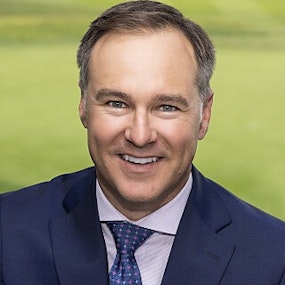
Immelman, Trevor
Golf Professional and Broadcaster
Trevor Immelman joined CBS Sports in December 2019 as a tower analyst for GOLF ON CBS coverage and was named as the network’s fifth lead golf analyst following the 2021-2022 PGA TOUR season.
Originally from South Africa, Immelman competed professionally for two decades on multiple professional tours, including the PGA TOUR, DP World Tour, and the Sunshine Tour. An 11-time winner worldwide, Immelman earned Rookie of the Year honors on the PGA TOUR in 2006, and two years later won the 2008 Masters Tournament.
Immelman competed as a player on two Presidents Cup teams (2005, 2007), and served as Vice Captain of the International team at the 2019 Presidents Cup. Most recently, he captained the International team at the 2022 Presidents Cup at Quail Hollow Club (Charlotte, N.C.).
New to FORE the Good of the Game?
Here are some great episodes to start with. Or, check out episodes by topic.














